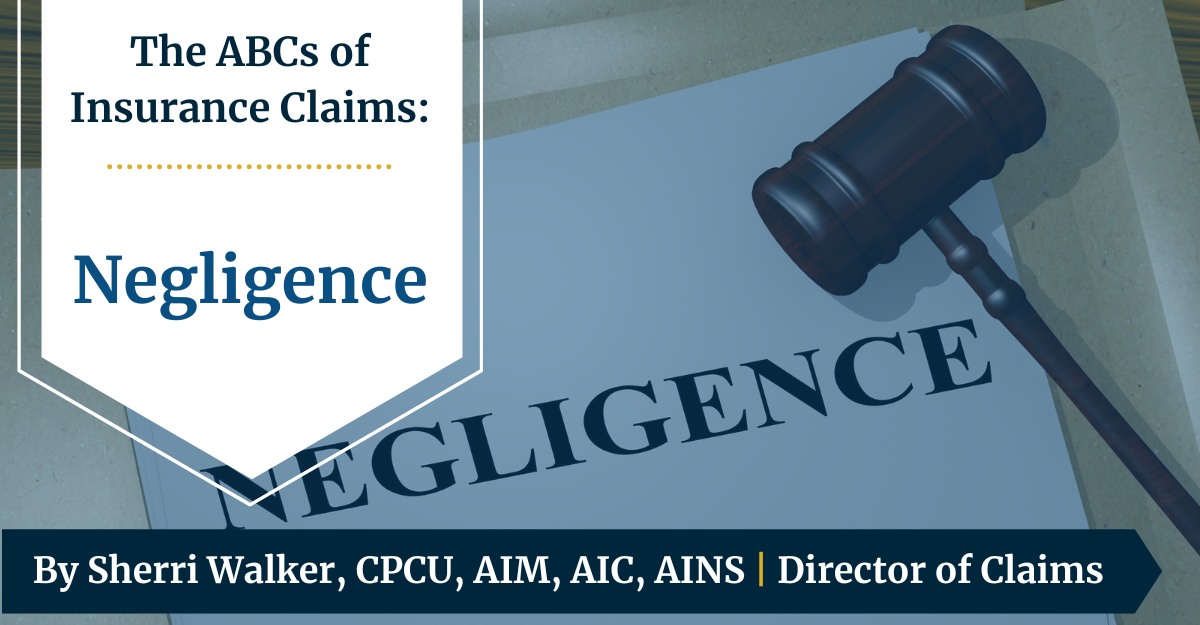Welcome to the ABCs of Insurance Claims. Over the next few months, Sherri Walker, Sentinel’s Director of Claims will address an aspect of claims handling for every letter of the alphabet to help provide a better understanding of the claims process.
N is for Negligence
Along the way in our series, we’ve touched on negligence and liability, but in limited detail. Now that we’re officially halfway through the alphabet, N seemed like the perfect time to delve deeper into what one of the most used terms in insurance truly means… So, without further ado, let’s dig into Negligence.
We have already discussed that insurance coverage will only pay for the things we are liable for under third-party coverages. For us to be deemed legally liable, there typically must be negligence found. Negligence is defined by Websters as “failure to exercise the care that a reasonably prudent person would exercise in like circumstances.” This is a great explanation, but when we are looking at negligence in claims, there are four elements that must be met to be deemed liable – Duty Owed, Duty Breached, Causation, and Damages. To understand these elements, we’re going to take a potential claim and break it down.
Claim Scenario
For sake of explanation, let’s consider a claim scenario. John Doe owns a home that he has had for 15 years. In that time, he’s done basic maintenance around the home routinely. However, he has a large back deck that has seen better days. For sure, John knows that the rail on one side has become a little wobbly. He keeps meaning to call someone out to look at it, but just hasn’t gotten around to doing it yet. John invites a couple of friends over for a get together, and while they are out on the deck chatting, one of his friends leans up against the rail and it comes loose and breaks away. His friend loses balance and in the process of trying to catch himself, he falls forward onto the deck and breaks his arm. As with any potential claim, the first step is to look at the elements to determine if John is negligent.
Duty Owed
What duty was owed? This is where the definition above truly comes in to play and where we ask, “What would I expect most people to do in this situation?” In the scenario above, John knew that the rail was wobbly, and even though it was still intact, a reasonable person should know that this was a potential danger. Unfortunately, “I meant to get to it previously” is not what we could consider prudent in this situation.
Duty Breached
Did John fail to meet the duty owed? In this situation, unfortunately John’s simple failure to act constitutes a breach of the duty to maintain a safe premises for invited guests. The act doesn’t have to be malicious and doesn’t even require that John did something in the moment. Breaching a duty isn’t always an active move; to the contrary more negligence occurs because of an inactivity over time than something happening in the here and now.
Causation
This is an element that can impact whether there is a claim or not. If John’s friend had been anywhere else on the deck and simply lost his balance, then his fall would not be caused by John’s negligence, and this would look like a very different claim. But since the loss of balance in this scenario is a result of the rail breaking, then we can conclude that causation was present here – even though the fall was forward on to the deck and not off the balcony with the rail, the proximate cause of this fall was still a result of the loss of balance precipitated by the rail breaking.
Damages
Again, this is a make-or-break moment as to whether there is any liability present. If John’s friend had fallen but didn’t sustain any injury, then there would be no damages, and everyone would likely have gone on about their evening and this would become a memory of the time John’s deck broke and his friend somehow managed to do some quick maneuvering, so he didn’t fall off the side. Unfortunately, since there’s now medical bills and possibly some lost time from work, we’ve moved on to a formal incident and John will be giving a statement to the adjuster about how he just “didn’t get around to calling the repairman.”
Safeguarding Your Success
As you can see, it’s very easy to land in the hot seat without even trying, just by not checking that one item off our “to do” list. This is just one of the reasons it is so important to make sure that you are properly covered. At some point in our lives, we will be negligent without even knowing about it. At Sentinel, our knowledgeable team is happy to review your policies to ensure your liability coverages are above deck. Contact us today to learn how to further Safeguard Your Success.


